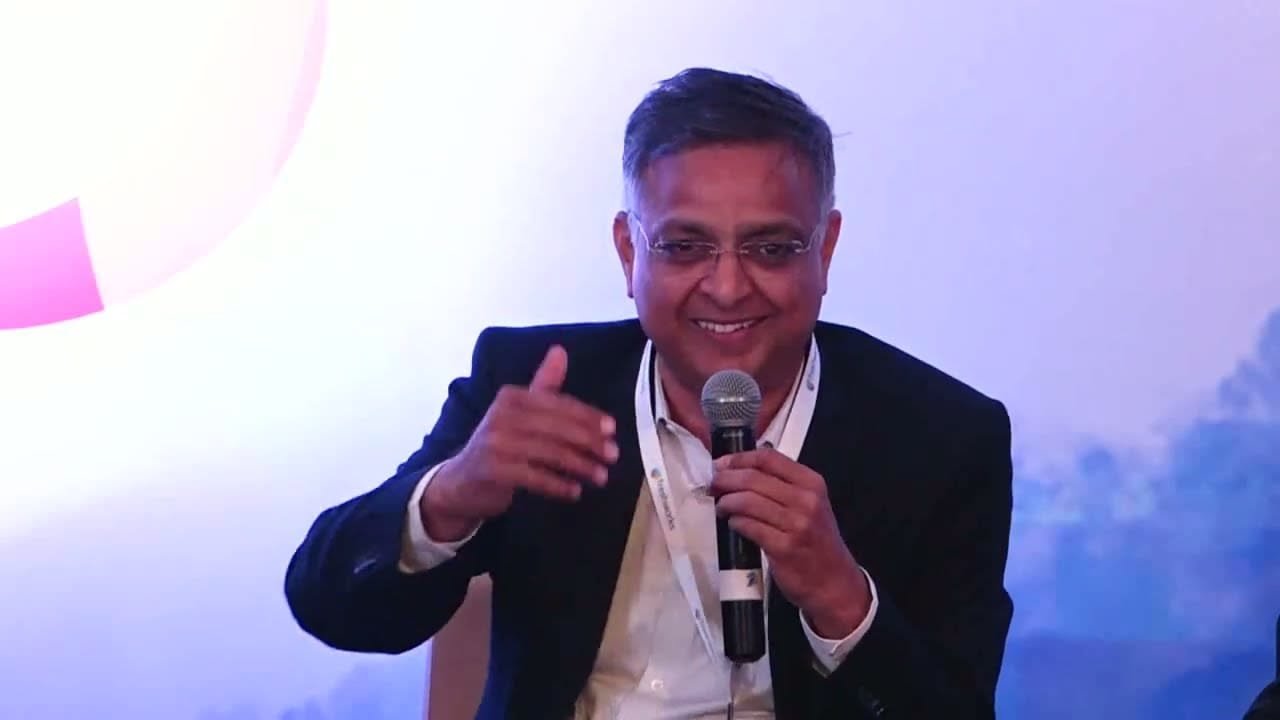With over 28 years of illustrious career, Ajitabh Sharma has been able to carve out a reputation as a transformative leader in public utility management and industrial development. His vision and dedication have shaped public services across sectors like water, energy, waste, mobility, housing, and communication.
His commitment to sustainability as a guiding principle has made him a beacon of hope for the future of urban development.
Ajithabh’s leadership philosophy is based on enhancing the corporate governance and transparency to be infused with the values of ESG into any decision-making process. In managing and transforming public utilities, he has set new standards for efficiency and sustainability, leaving a positive effect on the environment and on society.
A Trailblazer in Public Service
Ajitabh Sharma has also been recognized at several high government levels. Ajitabh Sharma has also been honored by the President of India, the Hon’ble Vice President of India, and other higher dignitaries for being an exceptionally meritorious officer in public service; these show his unquenching dedication to work for the welfare of the common people as well as have the strength to handle big deals.
He has had integral positions in various public utility operations throughout his career. In state irrigation boards, the renewable energy corporations, metro rail corporations, he served at all the top executive positions.
His concern is for transparency and removal of red tape that transformed these organizations into better service deliverers.
Current Assignment by Ajitabh: Taking Industrial Development to New Highs in Rajasthan
Ajitabh Sharma is currently the Principal Secretary of Industries for the Government of Rajasthan. In this position, he also heads the Rajasthan Industrial Development & Investment Corporation and the Delhi Mumbai Industrial Corridor Development Corporation.
His role includes handling Micro, Small, and Medium Enterprises (MSMEs) and acting as the Officer on Special Duty for Bhiwadi Integrated Development Authority.
Ajitabh is focusing on making Rajasthan a leader in logistics and industrial growth. His vast experience in public utility management and corporate governance makes him the right person to steer the state towards economic prosperity while following sustainable development practices.
The Rising Rajasthan Global Investment Summit: A Landmark Event
The much-awaited Rising Rajasthan Global Investment Summit is scheduled from December 9 to December 11 in Jaipur, where the leadership of Ajitabh Sharma will come into play. The purpose of this summit is to attract global investors and boost trade, business, and investment opportunities in Rajasthan.
One of the key architects behind the summit, Ajitabh is spearheading the effort to make Rajasthan a hub for industrial and economic growth.
The Government of Rajasthan has aligned itself strategically with 23 nations, deputing Ajitabh Sharma and other IAS officers for the purpose of discussion and collaboration.
This is evidence of Ajitabh’s ability to inculcate international views in local development so that Rajasthan can gain through international cooperation for growth.
Innovation and Sustainability
Ajitabh’s involvement in the summit reflects his even broader vision for Rajasthan’s future in industry.
With focus on logistics, sustainable development, and technological innovation, he wants to create a business-friendly ecosystem that balances needs with environmental concerns. This leadership will be key in ensuring that the summit does not end but is, instead, a new start for long-term economic development.
A Legacy of Excellence
Ajitabh Sharma is an example of a person who started off as a Civil Engineering graduate from IIT Delhi and now is a seasoned bureaucrat.
His experience in such a high position, chairman and managing director of Jaipur Metro Rail Corporation Limited, and his vast experience in public utilities reflect his handling of complex issues.
His administration would ensure Rajasthan reaches unprecedented milestones in industrial and economic development. His endeavors to bring sustainability into governance and improve the delivery of services are moulding the future of the state.
Ajitabh Sharma’s contributions to the growth of Rajasthan and his leadership in the organization of the Rising Rajasthan Global Investment Summit are something to be appreciated. The vision, experience, and commitment to sustainability have placed Rajasthan at the forefront of industrial development.
The summit is poised to be a turning point for the state, attracting investments from across the globe and fostering partnerships that will drive economic and social progress.
Ajitabh Sharma is not only a bureaucrat but a visionary leader whose efforts are shaping a brighter and more sustainable future for Rajasthan and its people.
Ted Talk Analysis on Policy Challenges in Climate Change and Mental Health
Ajitabh Sharma starts the discussion Health by acknowledging the multiple topics that previous speakers covered, including climate change, plastics, and innovative field-level actions. The speaker has 27 years of government experience and offers a rare insight into policy formulation, particularly in climate change and mental health.
Complexity in Policy Formulation
This describes the challenges that would arise while implementing successful policies in other states of India. Socio-economic systems are quite complex, and something working well in one region will not necessarily work in another.
The informal system always overpowers formal systems in the same legal and administrative framework, which causes inefficiency.
The Giddens Paradox and Its Consequences
The theory of the sociologist Anthony Giddens clarifies human behavior with regard to climate change. Human beings behave differently when the threat that faces them is immediate, direct, and visible but in the case of climatic change, it is mainly hidden and far away.
The Tragedy of the Horizon and Policy Inaction
Mark Carney’s tragedy of the horizon concept is such that the worst impacts of climate change are ahead of us. This lag makes people not act because policymakers, financial institutions, and even scientists do not prioritize solutions today.
The Problem of Attribution and Denial
Difficulties in directly linking the release of the emissions to the global warming and mental health issues contribute to denial about the problem. This denial contributes to a lack of attention and neglect across the board, whether it is policymaking levels or health professional levels, which delays taking proper action.
Reality of Climate Change and Mental Health Impact
According to reports from key research institutions, such as The Lancet, mental health remains the most ignored health problem globally.
Besides this, climate change affects mental health. More often than not, impacts of climate change have outweighed physical injuries by natural calamities.
Impacts of Climate Change on Mental Health End
The impacts of climate change are divided into three categories: acute, sub-acute, and chronic effects. Acute impacts include hurricanes and wildfires and lead to conditions such as post-traumatic stress disorder and survivor guilt. Sub-acute effects result from indirect impacts including migration and conflicts and trigger stress and discrimination.
Chronic impacts such as rising sea levels cause anxiety and isolation and give way to widespread psychosocial challenges.
Integrating Science and Art in Policy Formulation
Effective policies should merge scientific logic with empathy and compassion. The speaker makes reference to Alfred Marshall’s principle of “cool heads and warm hearts” to emphasize that the approach should be balanced. Policies are likely to fail if the emotional and social dimensions are not addressed.
Mainstreaming Climate and Mental Health Policies
Climate change impacts should be inculcated in medicine and mental health policies. Historical commitments like the Paris Agreement, Sustainable Development Goals, and the Sendai Framework should be brought together integrally in order to present a comprehensive challenge to climate change impacts.
Shift Focus: From Reaction to Preparedness
Moving to a preparedness and proactive approach is required instead of a reactive approach. Invisible mental health issues require not only early detection but building resilience in order to not flare up into crises. Moving in this direction also coincides with broader risk management.
Role of Sustainable Finance in Implementation
Inadequate financing is a big impediment to the impacts of mental health and climate change. In India, mental health expenditure comes in at only a small percentage of total health expenditure. Financial institutions, government, and private institutions must invest seriously in the required infrastructure.
Building Institutional and Individual Capacity
Capacity-building is crucial for individuals and institutions to adapt to crises. Strengthening resilience is essential as the world moves closer to critical climate thresholds, such as a 1.5 or 2-degree Celsius rise in global temperatures.
The talk concludes by repeating that science and empathy need to be brought together in policymaking. It will only be possible to overcome the interlinked challenges of climate change and mental health by cooperative efforts from all sectors.





One thought on “Ajitabh Sharma : Visionary Behind Rising Rajasthan Summit & Climate Change Policies”